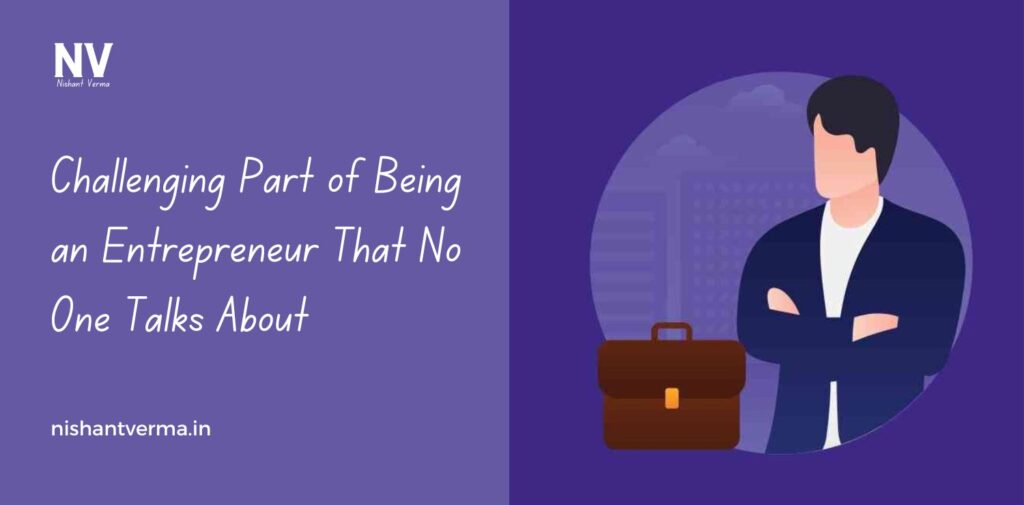As an entrepreneur, I can say that being my own boss, creating a business from scratch, and having the freedom to follow my vision are some of the most rewarding aspects of this journey. But, let’s be honest: entrepreneurship is not as glamorous as it may seem. While everyone talks about the success stories and the excitement of building something new, there is one challenging aspect of being an entrepreneur that rarely gets discussed openly—the constant mental and emotional strain.
In India, where entrepreneurship is becoming increasingly popular, we often see entrepreneurs being praised for their innovations, their leadership, and their ability to succeed in tough markets. Yet, few people openly talk about the emotional rollercoaster, the uncertainty, and the mental pressure that comes with being an entrepreneur. In this article, I want to shed light on this difficult aspect of entrepreneurship that no one talks about—so that aspiring entrepreneurs can better prepare themselves for the journey.
The Emotional Rollercoaster of Entrepreneurship
As entrepreneurs, we experience many highs and lows—sometimes in a single day. One moment we might feel like we are on top of the world, making breakthroughs and getting positive feedback from clients, and the next, we’re dealing with setbacks, disappointments, or the fear of failure. In India, where there is a strong cultural emphasis on success and achievement, this emotional rollercoaster can feel even more intense.

The Pressure to Succeed
In India, entrepreneurship is often seen as a pathway to success and social recognition. The idea of starting your own business is encouraged, but what is often overlooked is the intense pressure that comes with it. There’s a constant desire to prove yourself—not only to your customers but to your family, friends, and society. Many Indian entrepreneurs face the expectation of “making it big,” which can weigh heavily on the mind.
- Family Expectations: In many Indian families, especially in traditional setups, entrepreneurship can be met with skepticism. Parents may prefer their children to have stable government jobs or corporate careers, where there is less financial risk. As an entrepreneur, I often feel the pressure to not just succeed for myself but also for my family, who may have sacrificed a lot for me to pursue my dreams. The fear of letting them down can be emotionally draining.
- Social Comparison: India has a rapidly growing startup ecosystem, and it’s easy to get caught up in comparing your journey with others. Social media only adds to this pressure, where everyone’s success is on full display. It’s tough when you’re struggling to keep your business afloat, while other entrepreneurs seem to be achieving big things overnight.
Constant Uncertainty and Doubt
One of the most stressful aspects of being an entrepreneur in India (or anywhere in the world) is the constant uncertainty. Unlike a regular job where you know your paycheck is coming at the end of the month, entrepreneurship means you often have no clear idea of how the business will perform or when you’ll start making profits.
There are days when you question whether your idea is worth pursuing. You wonder if your hard work and effort will pay off, or if you’re just chasing a dream that may never come true. These self-doubts can be overwhelming. As entrepreneurs, we constantly worry about cash flow, employee retention, market competition, and whether our product or service is good enough.
- Customer Feedback: In India, where customer expectations are often high, getting negative feedback can be very discouraging. Sometimes, customers are quick to criticize, and it can feel like all your hard work is for nothing. This constant feedback loop—where we get positive reviews but also harsh criticisms—can take a toll on our emotional well-being.
- Lack of Stability: In the early stages of business, especially in India’s competitive market, stability is a luxury that many entrepreneurs don’t get to enjoy. Even if your product or service is great, there’s always uncertainty. Will the market accept it? Will the demand stay consistent? These questions hang over you, creating constant anxiety.
Burnout and Overwhelm
Entrepreneurship demands a lot from you. Initially, when you start a business, you are wearing multiple hats—working as the marketer, manager, salesperson, customer service agent, and more. This is a reality that no one warns you about. It’s exhausting.
You’re responsible for everything, and the weight of that responsibility can easily lead to burnout. As an entrepreneur, I’ve found myself working late nights, skipping meals, and sacrificing my personal time to make sure the business runs smoothly. This constant cycle of work can take a toll on both your physical and mental health.
In India, where work culture is often about putting in long hours and ‘hustling,’ it can be hard to find a balance. People expect you to work hard, and there’s an unspoken pressure to always appear busy. However, this can lead to exhaustion and a lack of motivation, which in turn affects productivity.

The Financial Strain
While entrepreneurs in India are often celebrated for their ability to create jobs and contribute to the economy, the financial struggles of starting and running a business are not often discussed. The reality is that entrepreneurship comes with significant financial uncertainty and strain.
- Initial Investment and Cash Flow Issues: As an entrepreneur, one of the most stressful parts of the journey is dealing with financial challenges. The initial stages of a business often require significant investment, and in India, where funding can sometimes be limited, this can become a major hurdle. You might have to dip into your savings, take loans from friends or family, or struggle to get investors on board. There are periods when you’re unsure whether you’ll have enough money to cover salaries, rent, and other business expenses. Even if your business is growing, cash flow issues can persist. As an entrepreneur, I’ve found that there are times when payments from clients or customers get delayed, which affects the financial health of the business. This financial pressure can lead to sleepless nights, increased stress, and a constant worry about the future.
- The Cost of Failure: While failure is an inherent part of entrepreneurship, the emotional and financial cost of failure is something that few talk about. In India, where failure is often viewed with a sense of shame, the stigma surrounding failed businesses can add to the burden. The fear of losing everything you’ve worked for, including your money, reputation, and relationships, is always present. For many entrepreneurs, the cost of failure can mean taking years to recover financially and emotionally.
The Social and Personal Sacrifices
Entrepreneurs in India are often seen as role models who have achieved success despite the odds. However, behind this image lies the reality of personal sacrifices that come with entrepreneurship. In the early stages, personal time, relationships, and social life can take a backseat.
- Time Away from Family and Friends: When you’re building a business, there’s very little time for anything else. Many entrepreneurs in India find themselves missing family events, weddings, or holidays because they’re so focused on their work. The desire to succeed often takes precedence over personal time, leading to strained relationships with family and friends. While they may be proud of you, they might also feel neglected, which can create emotional tension.
- Mental Health Struggles: It’s important to acknowledge the toll entrepreneurship can take on your mental health. The constant pressure, uncertainty, and emotional strain can lead to feelings of isolation, anxiety, and depression. In Indian society, mental health issues are often not openly discussed, and entrepreneurs may feel ashamed to admit that they’re struggling. However, it’s crucial to address these issues before they spiral out of control. Seeking professional help, talking to fellow entrepreneurs, and practicing self-care are essential steps to maintaining good mental health while running a business.

Conclusion: Being an Entrepreneur
Entrepreneurship is undoubtedly one of the most rewarding journeys you can take. But it’s not easy, and there are many challenges that people don’t talk about openly. The mental strain, emotional rollercoaster, financial uncertainty, and personal sacrifices can make the entrepreneurial journey incredibly tough at times.
As an entrepreneur myself, I’ve learned that it’s important to acknowledge these challenges and be prepared for the emotional ups and downs. It’s okay to feel overwhelmed or uncertain, and it’s important to reach out for support when needed.
To those who are considering starting their own businesses, know that it’s not all about the glamorous success stories you hear. It’s about resilience, determination, and the ability to navigate through tough times. If you’re prepared for the hard work, the sacrifices, and the emotional toll, entrepreneurship can be one of the most fulfilling paths you can take. But it’s important to keep in mind that it’s not always easy, and it’s okay to struggle. The journey is just as important as the destination.




